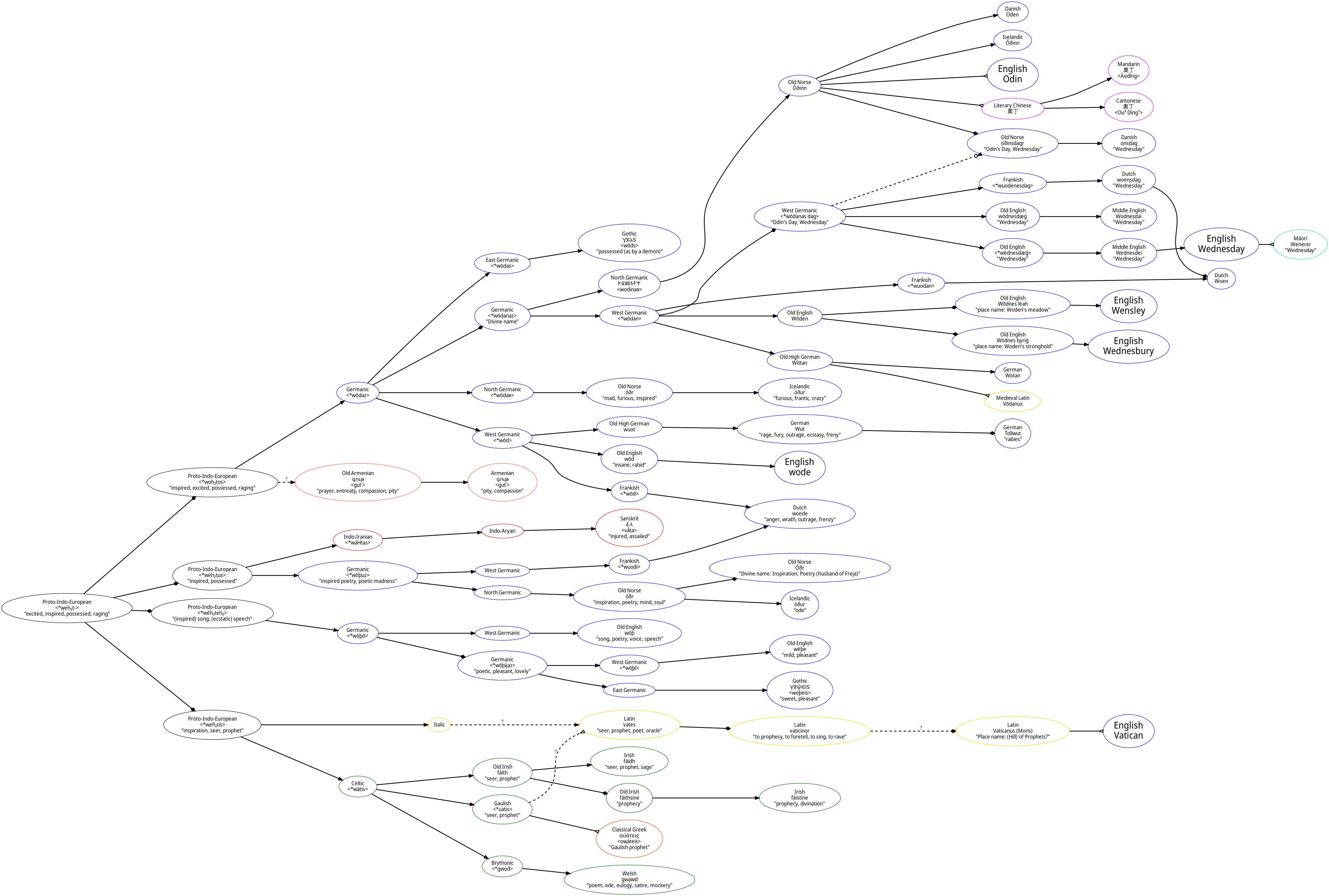Teaser
Full Text
-
Proto-Indo-European *weh₂t- excited, inspired, possessed, raging
-
Proto-Indo-European *woh₂tos inspired, excited, possessed, raging verbal adjective
-
Old Armenian գութ gutʿ prayer, entreaty, compassion, pity
- Armenian գութ gutʿ pity, compassion
-
Germanic *wōdaz
-
East Germanic *wōdas
- Gothic 𐍅𐍉𐌳𐍃 wōds possessed (as by a demon)
-
North Germanic *wōdaʀ
-
Old Norse óðr mad, furious, inspired
- Icelandic óður furious, frantic, crazy
-
-
West Germanic *wōd
-
Old English wōd insane, rabid
- English wode
-
Frankish *wōd
- Dutch woede anger, wrath, outrage, frenzy
-
Old High German wuot
-
German Wut rage, fury, outrage, ecstasy, freny
- German Tollwut rabies
-
-
-
Germanic *wōdanaz Divine name
-
North Germanic ᚹᛟᛞᛁᚾᚨᛉ wodinaʀ
-
Old Norse Óðinn
- Danish Oden
- Icelandic Óðinn
- English Odin
-
Literary Chinese 奧丁 [1]
- Mandarin 奧丁 Àodīng
- Cantonese 奧丁 Ou³ Ding¹
-
Old Norse óðinsdagr Odin's Day, Wednesday calque of West Germanic *Wōdanas dag
- Danish onsdag Wednesday
-
-
West Germanic *wōdan
-
Old English Wōden
-
Old English Wōdnes lēah place name: Woden's meadow
- English Wensley
-
Old English Wōdnes byriġ place name: Woden's stronghold
- English Wednesbury
-
-
Frankish *wuodan
- Dutch Woen partially back-formed from woensdag
-
Old High German Wōtan
- German Wotan
- Medieval Latin Vōdanus
-
West Germanic *wōdanas dag Odin's Day, Wednesday calque of Latin dies Mercurii
-
Old Norse óðinsdagr Odin's Day, Wednesday calque of West Germanic *Wōdanas dag
- Danish onsdag Wednesday
-
Old English wōdnesdæġ Wednesday
- Middle English Wodnesdai Wednesday
-
Frankish *wuodenesdag
-
Dutch woensdag Wednesday
- Dutch Woen partially back-formed from woensdag
-
-
-
-
-
-
-
Proto-Indo-European *wéh₂tus inspired, possessed Caland adjective
-
Germanic *wōþuz inspired poetry, poetic madness
-
North Germanic
-
Old Norse óðr inspiration, poetry, mind, soul
- Icelandic óður ode
- Old Norse Óðr Divine name: Inspiration, Poetry (husband of Freja)
-
-
West Germanic
-
Frankish *wuodi
- Dutch woede anger, wrath, outrage, frenzy
-
-
-
Indo-Iranian *wáHtas
-
Indo-Aryan
- Sanskrit 𑀯𑀸𑀢 vā́ta injured, assailed [3]
-
-
-
Proto-Indo-European *wéh₂teh₂ (inspired) song, (ecstatic) speech collective noun
-
Germanic *wōþō
-
West Germanic
- Old English wōþ song, poetry, voice, speech
-
Germanic *wōþijaz poetic, pleasant, lovely
-
East Germanic
- Gothic 𐍅𐍉𐌸𐌴𐌹𐍃 woþeis sweet, pleasant
-
West Germanic *wōþī
- Old English wēþe mild, pleasant
-
-
-
-
Proto-Indo-European *weh₂tis inspiration, seer, prophet noun
-
Celtic *wātis
-
Brythonic *gwọd
- Welsh gwawd poem, ode, eulogy, satire, mockery
-
Gaulish *uatis seer, prophet
- Classical Greek οὐάτεις owáteis Gaulish prophet
-
Latin vates seer, prophet, poet, oracle
-
Latin vaticinor to prophecy, to foretell, to sing, to rave with -cinor from canere: "to sing"
-
Latin Vaticanus (Mons) Place name: (Hill) of Prophets?
- English Vatican
-
-
-
Old Irish fáith seer, prophet
- Irish fáidh seer, prophet, sage
-
Old Irish fáithsine prophecy
- Irish fáistine prophecy, divination with metathesis
-
-
Italic
-
Latin vates seer, prophet, poet, oracle
-
Latin vaticinor to prophecy, to foretell, to sing, to rave with -cinor from canere: "to sing"
-
Latin Vaticanus (Mons) Place name: (Hill) of Prophets?
- English Vatican
-
-
-
-
-
Visual
Collected English words
Wensley, Wednesbury, Odin, Wednesday, wode, Vatican
Footnotes
-
^
The Chinese translation of "Odin"—奧丁—is amazing!
It's a close phonetic match: Pinyin: Àodīng, Jyutping: Ou³ Ding¹
But also, it translates as "Esoteric Man". Or possibly, with second round simplification, "Gaze upon the Esoteric"
-
^
English Wednesday is not the reflex of the usual Old English wōdnesdæġ, but appears to be from an unattested variant *wēdnesdæġ. Both variants appear in Middle English: Wednesdai and Wodnesdei, but only wednesday survives to Modern English. This is paralleled by place names referencing Woden: Old English Wōdnes lēah -> English Wensley, Old English Wōdnes byriġ -> English Wednesbury, etc.
-
^
Sanskrit 𑀯𑀸𑀢 vā́ta: "attacked, injured" is thought to derive from Proto-Indo-European *weh₂t-, but it's worth comparing it to Old Norse váði: "danger, peril, harm", which is thought to be from *weyk-: "to overcome".
